-
Recent Posts
- Palestinian Liberation in Education: Solidarities and Activism for a Free Palestine — Special Issue Call for Manuscripts
- Call for Submissions – Special Issue of Critical Education – Neoliberal Capitalism and Public Education
- Critical Education Special Issue – Call for Submissions CRITICAL HUMANISM AND PROBLEMS OF CHANGE
- Global Talks Thursday (Dec 10, 2020): Dialogue on Curriculum and Instruction in Relations to the Pandemic/Online Education
- Call for Papers: The Labour of COVID section of Workplace: A Journal for Academic Labour
Recent Comments
- E Wayne Ross on The Courage of Hopelessness: Democratic Education in the Age of Empire [Video]
- George Rammell on The Courage of Hopelessness: Democratic Education in the Age of Empire [Video]
- Shannon M on BC elementary school bans touching at recess #NoMoreTag #bced #yteubc #occupyeducation
- SD61 Board Meeting, June 17, 2013: The Record Off The Record: It Sounds So Nice | Lined Paper on BC schools face total budget shortfall of $130 million #bcpoli
- Monday Memo – June 3, 2013 | Surrey Teachers Association on BC Teachers Federation scores landmark victory in academic freedom and freedom of expression #bcpoli
Archives
- January 2024
- October 2023
- August 2023
- December 2020
- May 2020
- March 2020
- January 2020
- August 2017
- March 2017
- February 2017
- January 2017
- September 2016
- July 2016
- May 2016
- February 2016
- January 2016
- October 2015
- June 2015
- April 2015
- February 2015
- January 2015
- May 2014
- November 2013
- October 2013
- September 2013
- August 2013
- July 2013
- June 2013
- May 2013
- April 2013
- March 2013
- February 2013
- January 2013
- December 2012
- November 2012
- October 2012
- August 2012
- July 2012
- June 2012
- May 2012
- April 2012
- March 2012
- February 2012
Categories
- Academic freedom
- Adjuncts
- Administration
- BC Education
- Budgets & Funding
- CAUT
- CFPs
- Civil Liberties
- Commentary
- Conferences
- Contracts
- Corporate University
- Critical Education
- Disputes
- Environment
- Equity
- Ethics
- Faculty
- Free speech
- Governance
- Government
- Idle No More
- Job cuts
- K-12 issues
- Layoffs
- Legal issues
- Organizing
- Privatization
- Protests
- Publishing
- Research
- Salary/Economic Benefits
- Strikes & Labor
- Student Movement
- Student Speech
- Students
- Talks and seminars
- Teachers
- Tenure & Promotion
- Testing
- Textbooks
- Uncategorized
- Unions
- University Presidents
- Violence
- Working condition
Meta
-
Category Archives: BC Education
Teaching and the ideology of neutrality
This week, in my course on secondary social studies curriculum, we discussed various ideological stances toward curriculum. Predictably, the issue of “neutrality” in social studies teaching came up.
Indeed, my students reported that as part of their professional preparation in the UBC B.Ed. program they have been repeatedly told that teachers should always strive for neutrality in their classrooms, I disagree.
Teaching (and curriculum) cannot be separated from politics. And, adopting the ideology of neutrality is to surrender agency and professionalism as a classroom teacher.
The ideology of neutrality is based upon theories of knowledge and conceptions of democracy that constrain rather than widen civic participation and has consequences that include passive, rather than active, learning; representation of democratic citizenship as a spectator project; and ultimately the maintenance of status quo inequalities in society.
Below is an excerpt from a recent paper I wrote with Kevin D. Vinson that takes up the issue.
Ideology of Neutrality, or What Exactly Are We Protecting Students From?
… Educators often eschew openly political or ideological agendas for teaching and schools as inappropriate or “unprofessional.” The question, however, is not whether to allow political discourse in schools or to encourage particular social visions in the classroom, but rather what kind of social visions will be taught?
There is a misguided and unfortunate tendency in our society to believe that activities that strengthen or maintain the status quo are neutral or at least non-political, while activities that critique or challenge the status quo are “political” and inappropriate. For example, for a company to advertise its product as a good thing, something consumers should buy, is not viewed as a political act. But, if a consumer group takes out an advertisement charging that the company’s product is not good, perhaps even harmful, this is often understood as political action.
This type of thinking permeates our society, particularly when it comes to schooling and teaching. “Stick to the facts.” “Guard against bias.” “Maintain neutrality.” These are admonitions or goals expressed by some teachers when asked to identify the keys to successful teaching. Many of these same teachers (and teacher educators) conceive of their roles as designing and teaching courses to ensure that students are prepared to function non-disruptively in society as it exists. This is thought to be a desirable goal, in part, because it strengthens the status quo and is seen as being an “unbiased” or “neutral” position. Many of these same teachers view their work in school as apolitical, a matter of effectively covering the curriculum, imparting academic skills, and preparing students for whatever high-stakes tests they might face. Often these teachers have attended teacher education programs designed to ensure that they were prepared to adapt to the status quo in schools.
Anyone who has paid attention to the debates on curriculum and school reform knows that schooling is a decidedly political enterprise (DeLeon & Ross, 2010; Mathison & Ross, 2008a; Mathison & Ross, 2008b; Ross & Gibson, 2007; Ross & Marker, 2005a, 2005b, 2005c). The question in teaching (as well as teacher education and school reform) is not whether to allow political discourse in schools or whether to advocate or not, but the nature and extent of political discourse and advocacy. “The question is not whether to encourage a particular social vision in the classroom but what kind of social vision it will be” (Teitelbaum, 1998, p. 32).
It is widely believed that neutrality, objectivity, and unbiasedness are largely the same thing and always good when it comes to schools and teaching. But, consider the following. Neutrality is a political category—that is—not supporting any factions in a dispute. Holding a neutral stance in a conflict is no more likely to ensure rightness or objectivity than any other and may be a sign of ignorance of the issues. Michael Scriven (1991) puts it this way: “Being neutral is often a sign of error in a given dispute and can be a sign of bias; more often it is a sign of ignorance, sometimes of culpable or disabling ignorance” (p. 68). Demanding neutrality of schools and teachers comes at a cost. As Scriven points out there are “clearly situations in which one wants to say that being neutral is a sign of bias” (p. 67). For example, being neutral in the debate on the occurrence of the Holocaust; a debate on atomic theory with Christian Scientists; or a debate with fundamentalist Christians over the origins of life and evolution. To rephrase Scriven, it seems better not to require that schools include only neutral teachers at the cost of including ignoramuses or cowards and getting superficial teaching and curriculum.
Absence of bias is not absence of convictions in an area, thus neutrality is not objectivity. To be objective is to be unbiased or unprejudiced. People are often misled to think that anyone who comes into a discussion with strong views about an issue cannot be unprejudiced. The key question, however, is whether and how the views are justified (e.g., Scriven, 1994).
“A knowledge claim gains objectivity…to the degree that it is the product of exposure to the fullest range of criticisms and perspectives” (Anderson, 1995, p. 198). Or as John Dewey (1910) argued, thoughts and beliefs that depend upon authority (e.g., tradition, instruction, imitation) and are not based on a survey of evidence are prejudices, prejudgments. Thus, achieving objectivity in teaching and the curriculum requires that we take seriously alternative perspectives and criticisms of any particular knowledge claim. How is it possible to have or strive for objectivity in schools where political discourse is circumscribed and neutrality is demanded? Achieving pedagogical objectivity is no easy task. The objective teacher considers the most persuasive arguments for different points of view on a given issue; demonstrates evenhandedness; focuses on positions that are supported by evidence, etc.
This kind of approach is not easy, and often requires significant quantities of time, discipline, and imagination. In this light, it is not surprising that objectivity is sometimes regarded as impossible, particularly with contemporary social issues in which the subject matter is often controversial and seemingly more open to multiple perspectives than in the natural sciences. However, to borrow a phrase from Karl Popper, objectivity in teaching can be considered a “regulative principle,” something toward which one should strive but which one can never attain. (Corngold & Waddington, 2006, p. 6)
The “ideology of neutrality” that dominates current thought and practices in schools (and in teacher education) is sustained by theories of knowledge and conceptions of democracy that constrain rather than widen civic participation in our society and functions to obscure political and ideological consequences of so-called “neutral” schooling, teaching, and curriculum. These consequences include conceptions of the learner as passive; democratic citizenship as a spectator project; and ultimately the maintenance of status quo inequalities in society.
For more on this issue, you may want to read this piece: “Redrawing the Lines: The Case Against Traditional Social Studies Instruction.”
BC school district adopts anti-homophobia policy #bcpoli #bced #yteubc #ubced
ABOUT A THIRD OF ALL BC SCHOOL DISTRICTS HAVE A SIMILAR POLICY IN PLACE
Renee Bernard, News1130, November 15, 2013– The largest school district in the province will become the latest to adopt an anti-homophobia policy.
Surrey school board trustees have voted unanimously to embrace the new anti-discrimination code.
Gioia Breda of the Surrey Teachers Association worked on the document and says it’s an important philosophical statement to support students facing homophobic bullying.
“You can compare students who experience racism, for example. When they go home, those students have parents who are often supportive and sympathize, whereas LGBTQ youth may not have come out to their parents,” she explains.
She calls it a pro-active code.
“It offers a positive and inclusive curriculum, more sexual health education for LGBTQ youth, and education for administrators, staff and counsellors about LGBTQ issues.”
She says the policy is designed to protect both students and staff.
Just over a decade ago, the school board made national headlines in its fight to ban books featuring same-sex couples, a policy it eventually changed.
The board’s anti-bullying code was adopted with relative ease, compared to the situation in Burnaby a few years ago, when that school board encountered protests from parents.
About a third of all BC school districts have anti-homophobic bullying policies in place.
Read More: News1130
Posted in BC Education, Working condition
Tagged BC education, Critical Education, Equity, Ethics, K-12 issues, Protests, Student Movement, Students, Teachers, Working conditions
Students say “We’re young, not stupid:” Keep big oil out of our schools #bced #yteubc #bcpoli #DavidSuzuki #occupyeducation
pump jack writes curriculum
This is what you call genuine pro-activism. Barely a month into its launch of Energy IQ (yes, “IQ”), Canadian Geographic is sheepishly back-pedalling and having to answer to students. Energy IQ is to be The Energy Curriculum for the entire nation. The first hint that something was suspect about this was the photo gallery in the June Canadian Geographic Magazine that featured and introduced the new Energy IQ curriculum. As if the author of the curriculum, the proud Pump Jack, “iconic symbol of the West,” dominates. Is this is a curriculum about, for, and from BIG power?
That’s the question students in Vancouver are asking as they join forces with Power Shift, a green grass roots environmental movement. “We’re young, not stupid,” they say, “Keep big oil out of our schools.” The students’ Open Letter and petition are generating international interest and momentum. Dear CAPP, the students write: “The Energy IQ program is of serious concern to us as current high school students, specifically because of its inherent corporate bias and the ideals it will promote…. Propaganda has no place in our schools.” The high school activists currently have over 600 supporters signed on to the petition and were featured by the CBC (tv and radio) on 14 November.
The two student-activists at the front of the protest, Sophia and Sydney, note that “We just believe we should not have corporations in our public classrooms” “It’s just not saying the full truth and we really believe that it shouldn’t be used in the classrooms.”
And this pro-activism is excellent timing, as the new Pump Jack curriculum begins to make its way into the schools. Just as oil and gas dominate clean energy in Canada, the students are asking why Pump Jack is behind the Energy IQ Curriculum.
Yes, teachers and students can criticize the curriculum and politically remix it, but prior questions are those the students are asking, whether Pump Jack ought to be authoring and issuing curriculum for the schools. Or why is Canadian Geographic joined with Pump Jack?
Or what in the world is going on with the Geography curriculum? The Pump Jack curriculum is linked to the Canadian National Standards for Geography, but the energy and economics Standards within might as well have been written by Pump Jack itself. The word “capitalism,” Pump Jack’s child and daddy (go figure) economic system for a century, does not appear in the Standards. For the Environment and Society standard, students can “Speculate on the environmental consequences of a major long-lasting energy crisis (e.g., high/low crude oil prices),” and maybe speculating is enough. Surely, documenting and acting on climate change need not be a standard. Of course, “climate change” does not appear in the Standards either.
Invented in Oil City (it’s true) in 1913, Pump Jack is celebrating its 100th birthday this year so maybe it is appropriate that it authors and teaches the global Energy IQ curriculum. Happy Birthday Pump Jack! Remember the combination: 40-31-24-5.
Posted in BC Education
Tagged BC education, Critical Education, Environment, K-12 issues, Protests, Students, Teachers, Textbooks
BC gov wasted $66-million over 12 years on failed aboriginal child services #bcpoli #bced #yteubc #idlenomore
Lindsay Kines, Victoria Times Colonist, November 6, 2013– The B.C. government’s failed attempt to reform the aboriginal child welfare system during the past 12 years has wasted nearly $66 million without helping a single child, the province’s child watchdog says in a new report.
Mary Ellen Turpel-Lafond accuses the government and aboriginal organizations of blowing money on consultants, pointless research projects and endless meetings that go nowhere and deliver no tangible results.
“To be blunt, a significant amount of money has gone to people who provide no program or service to directly benefit children,” she writes in her 86-page report, When Talk Trumped Service.
More than half the money was spent on a failed effort to set up Regional Aboriginal Authorities, while the rest went to self-governance initiatives in the Ministry of Children and Family Development that bled money away from front-line services, the report says.
Turpel-Lafond said the “colossal failure of public policy” took place at a time when many aboriginal children have no safe place to live and no help coping with violence, abuse, mental illness and learning disabilities.
“Children and youth deserve better, and the best contrition for this rather shameful debacle would be a real effort to improve the outcomes for those children by actually knowing what they require and what works to support them — to stop directing the money into the big theoretical fixes, and instead shore up the front lines of the system, especially in those places where the paved roads end in B.C.,” the report says.
Turpel-Lafond spares no one in her report, noting that aboriginal organizations — particularly political groups — have been willing participants in the fiasco.
“Whether this is because they have been so overburdened by so many agendas . . . or if they believe that they are actually making progress, the representative is unsure,” the report says.
The report urges the Ministry of Children and Family Development to refocus its energy on delivering front-line services to children and leave discussions about a self-government to the Attorney General.
Turpel-Lafond said Children’s Minister Stephanie Cadieux has indicated that she was unaware of the problems.
Cadieux, who is slated to speak with reporters this afternoon, issued a statement in which she said the ministry agrees with Turpel-Lafond’s findings and recommendations.
“We know our focus needs to be on providing direct services to aboriginal children and families,” the statement said. “That’s why, two years ago, the newly appointed deputy minister began the process of shifting the focus of contracts from governance to service delivery.”
All aboriginal contractors have been told that future contracts will focus on direct services, Cadieux said.
She denied, however, that the money spent over the past decade was wasted. “Our efforts to build relationships with First Nations communities have established a solid foundation for government as it continues to move forward on the development of government structures.”
Read More: Victoria Times Colonist
Posted in BC Education
Tagged BC education, Budgets & Funding, Equity, Ethics, Government, Idle No More, K-12 issues, Organizing, Protests, Students
All forms of hands-on play banned at BC kindergarten #NoMoreTag #bced #yteubc #occupyeducation
One might find a ban on “all forms of hands-on play… This includes tag, holding hands, and any and all imaginary fighting games,” in no Funcouver, especially if the Sedin brothers are on a penalty kill (some Canucks fans will assess a 5 minute major to me here), but who’d thunk it on a kindergarten playground in Aldergrove? That’s correct, no more tag on this playground. No holding hands either.
Here’s the letter from administrators at Coghlan Elementary sent home in the children’s backpacks:
Coghlan Fundamental Elementary SCHOOL (SD35)
November 1, 2013
Dear Kindergarten Families,
Over the past couple of weeks during outside play time, we have had a number of injuries as a result of various games and types of hands-on play. This has impacted the safety of all the children outside.
Consequently, we have unfortunately had to ban all forms of hands-on play for the immediate future. This includes tag, holding hands, and any and all imaginary fighting games. “Star Wars” games have been particularly difficult for the Kindergarten children to remember to keep their hands to themselves. We will have a zero-tolerance policy with regards to hands-on play, resulting in the missing of playtime and trips to the office for those who are unable to follow the rules.
If you could please help to remind your child about keeping his or her hands to themselves, and reinforce other imaginary games (rather than fighting games) it would really help us to get the message across.
We really appreciate your cooperation and support in this matter.
Read More: CBC
Posted in BC Education
Tagged BC education, K-12 issues, NoMoreTag, Students, Teachers
BC elementary school bans touching at recess #NoMoreTag #bced #yteubc #occupyeducation
Letter to parents: Aldergrove school says policy prompted by playground injuries
Gordon McIntyre & Ian Austin, The Province, November 5, 2013– You’ve heard the Alice Cooper lyrics “no more pencils, no more books … .” For kindergarten kids at Coghlan Fundamental Elementary School, tucked away in a remote rural area of Aldergrove, it’s no more tag, no holding hands, or you’ll get teacher’s dirty looks.
A letter went out to Coghlan kindergarten students’ parents on Friday, one of those types that often sit in backpack over a weekend or are put aside to be read later and somehow never are.
Julie Chen found the letter, explaining a new no-touch policy for kindergarten students, on Monday morning as she was packing lunch for her five-year-old daughter.
It reads, in part: “We have unfortunately had to ban all forms of handson play for the immediate future … we will have a zero-tolerance policy.”
Penalties for making physical contact with a schoolmate include being grounded during play time and/or a trip to the office “for those who are unable to follow the rules.”
“I read the letter, it said there had been quite a few injuries, I said, ‘OK,’ and kept reading,” Chen said. “When I saw no hands-on would be allowed, I just got mad, I got so upset.
“What is happening in our society when our kids aren’t even allowed to be kids any more? “Kids get hurt all the time. What are we going to do next, put them in a bubble to go to school?” Chen said she talked to other moms on Monday and most hadn’t read the letter. Based on what Chen told them, she said, they were appalled.
“I’m not going to tell my daughter she can’t push her friends on the swing,” Chen said. “Do we expect our kids to be robots? How can they possibly do this? They’re five-yearolds – you can’t stop them from running around and having physical contact.”
Read More: The Province
Posted in BC Education
Tagged Administration, BC education, K-12 issues, Students, Teachers
Some still consider social justice in schools to be “indoctrination” #bced #yteubc #occupyeducation
Perhaps not too surprising all things considered in BC, the Social Justice 12 course continues to be dismissed as indoctrination. One one hand, it’s not surprising given the swing right over the past dozen years in the province. On the other, any subject or course that is not one of the official nine (i.e., art, careers, applied skills, language, math, music, physical education, science, socials) is nearly doomed to skepticism or marginalization. In the Surrey Leader, Tom Fletcher belittles the course as “student indoctrination” and curriculum activities endorsed by the BCTF as “one-sided caricatures:”
Their buzzword is “social justice,” which is portrayed by leftists as superior to plain old justice, in ways that are seldom defined. So what exactly are the goals of this “social change”? Here’s some of what I’ve gleaned.
Parents may recall the 2008 introduction of an elective high school course called Social Justice 12. This was mainly the result of intense protest by a couple of gay activist teachers, and the ministry curriculum describes its emphasis on inclusion of racial, cultural and sexual differences…. BCTF bosses love to talk about the importance of “critical thinking.” These one-sided caricatures of Nike, Enbridge and other familiar villains seem designed to produce the opposite.
Today’s follow-up response to the column reiterates the conservative, anti-union politics at hand:
Great column. I consider this one as one of the most important ones that Tom Fletcher has written, alongside the one about “science gives way to superstition”.
If the B.C. Teachers’ Federation advocates a collectivist ideology such as socialism, the chances of saving our children from the influence of dangerous, very militant, egalitarian philosophy are slim.
Like it or not, the BCTF is one of the most astute, successful labor unions in the country and Social Justice 12 stands as the single-most progressive curriculum innovation in BC over the past 25 years. Given its origins in the passionate commitments to education by a courageous, gay couple, tenuous existence and tests in and out of courts for almost a decade, conservative challenges to deny enrolment in certain districts, and a challenge to the official curriculum, the course triumphed. This was against nearly all odds. Social Justice 12 is that important– not as content per se but as an example and precedent that curriculum can be transformative and transformed.
And the lesson is this simple: Through its professionalism, insights, and yes, politics, BCTF finds the way, opens the doors, and welcomes these necessary additions to an overly officious curriculum. In that way, the BCTF’s social justice politics and the course are refreshing for a change in this province.
Posted in BC Education, Unions
Tagged BC education, BCTF, Critical Education, Equity, Ethics, K-12 issues, Students, Teachers, unions
BCPSEA backs down on free expression dispute with teachers / BCTF #bced #yteubc
Over the last decade, the British Columbia Teachers’ Federation has systematically tested the limits of free expression for teachers. Through a series of grievances, arbitrations, and court cases, the BCTF has provided one of the most important legal records for teachers’ freedom of expression. The result is nothing short of a significant precedent for the schools.
Earlier this month, a bit of cleaning up after a court decision in the spring resolved the issue of Yertle the Turtle. The BC Public School Employers’ Association (BCPSEA) finally backed down on the BCTF local’s challenge to the BCPSEA’s ban of certain quotes from the venerable Dr. Seuss book. Finally again, we will see teachers quoting truth to power: “I know up on top you are seeing great sights, but down here on the bottom, we too should have rights.”
This is far from the end, as free expression and academic freedom in the schools require active, living tests of boundaries and lines. The ban lifted on Yertle the Turtle turns a page but does not yet finish the chapter. The quotes from Yertle were spoken for a larger scope of rights, including rights to bargain contracts and define class sizes. For that, the BCTF’s appeal has gone back to the Supreme Court.
Children’s book ‘Yertle the Turtle’ now OK again in unionized B.C. classrooms
Terri Theodore, Globe and Mail, October 11, 2013– “Yertle the Turtle” is no longer under ban.
“Yertle the Turtle” can gather more fans — in school districts around British Columbia.
A freedom of expression grievance has been settled between the BC Teachers’ Federation and the B.C. Public School Employers’ Association based on the Dr. Seuss children’s book about a turtle trying to assert its rights.
The complaint was one of several made by the union when some school districts were banning classroom displays of union posters, buttons and T-shirts in the middle of a teachers’ contract dispute.
In one case, an administrator vetoed a quote for classroom display in Prince Rupert from the book “Yertle the Turtle,” saying it was too political.
Dave Stigant, with the Prince Rupert district, was given about 20 quotes from the book to determine if they would be appropriate to expose to students during an ongoing labour dispute.
He didn’t like this quote: “I know up on top you are seeing great sights, but down here on the bottom, we too should have rights.”
BCTF President Jim Iker said the quote was just a small example of several instances where the union felt it had a claim of unfair labour practices in the province.
“But definitely the ‘Yertle the Turtle’ one out of Prince Rupert highlighted the whole issue of freedom of expression and our constitutional rights.”
Iker said several such claims went to arbitration over the last four or five years before the issue was ironed out.
The complaints were settled based on a previous court case, a key arbitration ruling and an agreement with the employer on freedom of expression rights.
Teachers are now allowed to display or wear union posters, buttons and T-shirts.
“I’m hoping it clears it up. I think it actually gives both sides certainty and we know where the limits are in terms of materials and what we’re able to display or not display, and I think the employer knows what the expectations are,” Iker said.
He said teachers also know that they can’t discuss any kind of political or union messaging with students during instruction time.
Read More: Globe and Mail

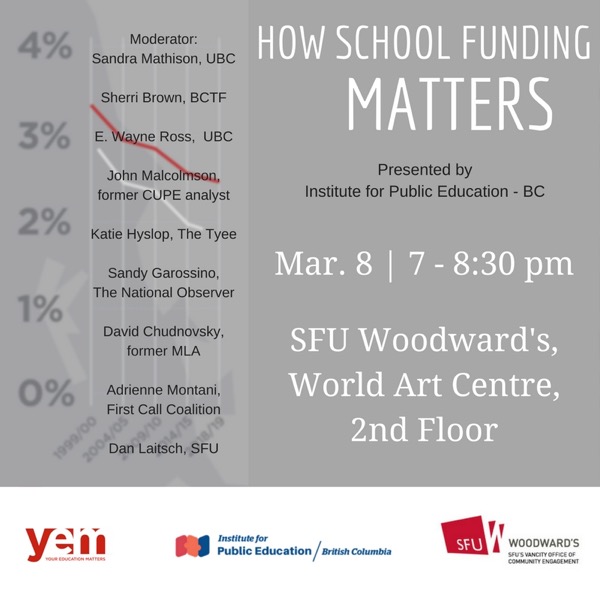
 Follow
Follow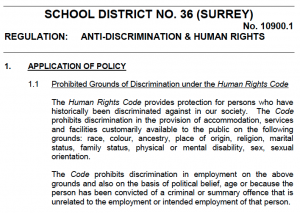
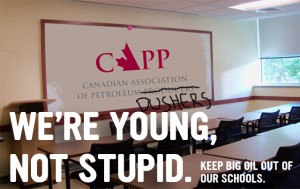
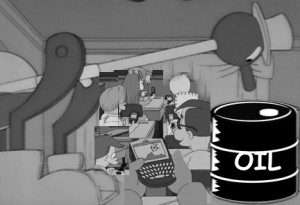
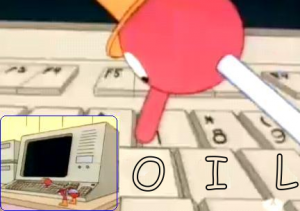


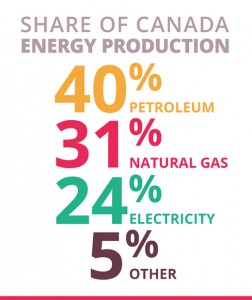

Do private programs belong at public universities?
The University of Victoria has contracted with the Canadian telecom giant Telus to deliver a “customized” MBA program to Telus employees.
Telus executives will be teaching some of the courses; the instructors from UVic will apparently be teaching on contracts separate from their regular employment with the university. The details are sketchy because the agreement between the UVic and Telus is secret.
Here’s university’s press release on the new program, which is offered in the Sardul S. Gill Graduate School within UVic’s Peter B. Gustavson School of Business. The program gets started this month.
The program is the brain child of Telus’s “Chief Envisioner,” Dan Pontefract. Pontefract described the context and goals of the program in an Forbes magazine article this past August, “Going Back To School With A Corporate MBA Program.” (A Huffington Post version of the article appeared in September, “Why Corporations Should Launch Their Own MBA Programs“).
Victoria’s Times-Colonist and The Tyee have also run articles about the program.
Neither Telus nor UVic have (or plan to) release details of the financial agreement, as The Times-Colonist reports
The program raises a raft of questions about academic governance, academic freedom, the vulnerability of public universities to corporate incursions as a result of budget slashing governments.
This program represent the next step in the ever evolving corporatization of the university, another neoliberal education policy that socializes costs and privatizes benefits.
I appeared on CBC Radio’s The 180 with Jim Brown (along with Pontefract) to discuss the UVic/Telus MBA program and the corporatization of academe.
The 12 minute segment will be broadcast tomorrow (October 4, 2015), but you can stream the segment online now: Do private programs belong at public universities?
Leave a comment
Posted in BC Education
Tagged CBC, cdnpse, Commentary, Corporate University, Critical Education, higher education, interview, post-secondary education, public education, radio interview, Telus, The 180 with Jim Brown